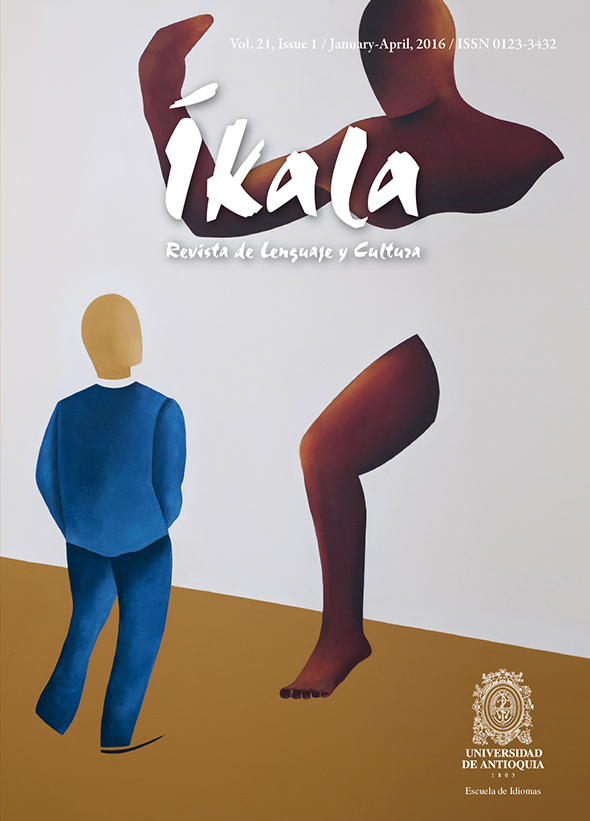Towards training in specialized translation: facts and challenges
DOI:
https://doi.org/10.17533/udea.ikala.v21n01a04Keywords:
specialized translation, translation didactics, translators’training, translation competence, French-Spanish Translation Studies, Faculty of Languages, University of Córdoba (Argentina).Abstract
Within the context we are currently immersed in and within which we develop our activities, the need for linguistic and intercultural mediators trained and qualified in specialized translation practice has become pressing. As trainers of future translation professionals, we are quite aware of this reality, but at the same time, reaching out to these constantly evolving manifestations that need to —or should— be expressed in another language differently poses a permanent challenge to us. Despite advances in the field of translation training and the new theoretical approaches dealing with the subject of professional practice, to design an academic syllabus always involves new challenges. As teachers of specialized translation program in French at the School of Languages, National University of Córdoba, Argentina, we have to introduce our students to this particularly characteristic world. In this article, we intend to reflect upon certain key points regarding translators´ training in our environment —In which contexts, both geographical and working, will be future translators immersed? What knowledge level do students display in this introductory stage to specialized translation? How do we guarantee our students are comprehensively trained? Based on these questions, we will take a look at our educational reality and the challenges it poses, which will lead us to rethink our methodologies and the approaches related to specialized translation teaching.
Downloads
References
Consejo de Europa (2002). Marco común europeo de referencia para las lenguas: aprendizaje, enseñanza y evaluación, Estrasburgo. Traducción al español realizada por el Instituto Cervantes, a partir del original redactado en inglés: Council for Cultural Cooperation Education Committee Language Policy Division (2001). Common European Framework for Languages: Learning, Teaching, Assessment. Recuperado el 8 de julio de 2013, de: http://cvc.cervantes.es/ensenanza/biblioteca_ ele/marco/indice.htm
Delisle, J. (1984). L’analyse du discours comme méthode de traduction. Initiation à la traduction française de textes pragmatiques anglais. Canadá: Èditions de l’Université d’Ottawa.
Gamero Pérez, S. (2001). La traducción de textos técnicos. Barcelona: Ariel.
Gouadec, D. (2002). Profession traducteur. París: La Maison du Dictionnaire.
Guidère, M. (2008). Introduction à la Traductologie. Penser la traduction : hier, aujourd’hui, demain. Bruselas: De Boeck.
Hurtado Albir, A. (2011). Traducción y traductología. Introducción a la traductología. 5.a ed. Madrid: Cátedra.
Hurtado Albir, A. (Dir.) (1999). Enseñar a traducir. Madrid: Edelsa.
Hurtado Albir, A. (Ed.) (1996). La enseñanza de la traducción. Castellò: Publicacions de la Universitat Jaume I, D. L.
Mayor Serrano, M. B. (2006). Criterios para las selecciones textuales en la formación de traductores especializados. En Translation Journal, 10(1). Recuperado en enero de 2014, de: http://www.bokorlang.com/ journal/35seleccion.htm
Mayoral Asensio, R. (2004). Lenguajes de especialidad y traducción especializada. La traducción jurídica. En Gonzalo García, C. y García Yebra, V. (Eds.), Manual de documentación y terminología para la traducción especializada (pp. 49-71). Madrid: Arco Libros.
Mayoral Asensio, R. (2007). Traducción comercial. En Fuertes Olivera, P. (Ed.), Problemas lingüísticos en la traducción especializada (pp. 33-48). Valladolid: Universidad de Valladolid.
Nord, Ch. (2008). La traduction: une activité ciblée. Introduction aux approches fonctionnalistes. Traducido del inglés por Beverly Adab (1997). Translating as a Pur- poseful Activity. Functionalist Approaches Explained. Arras: Artois Presses Université. Col. Traductologie.
Procés d’Adquisició de la Competencia Traductora i Avaluació (PACTE) (2015). Recuperado de: http://grupsderecerca.uab.cat/pacte/es
Robert, J.-P. (2008). Dictionnaire pratique de didactique du FLE. Nouvelle édition revue et augmentée. Col. L’essentiel français. Paris: Ophrys.
Waddington, Ch. (1999). Estudio comparativo de diferentes métodos de evaluación de traducción general: inglés- español. Madrid: Universidad Pontificia Comillas.
Published
How to Cite
Issue
Section
License
Copyright (c) 2016 Íkala

This work is licensed under a Creative Commons Attribution-NonCommercial-ShareAlike 4.0 International License.












